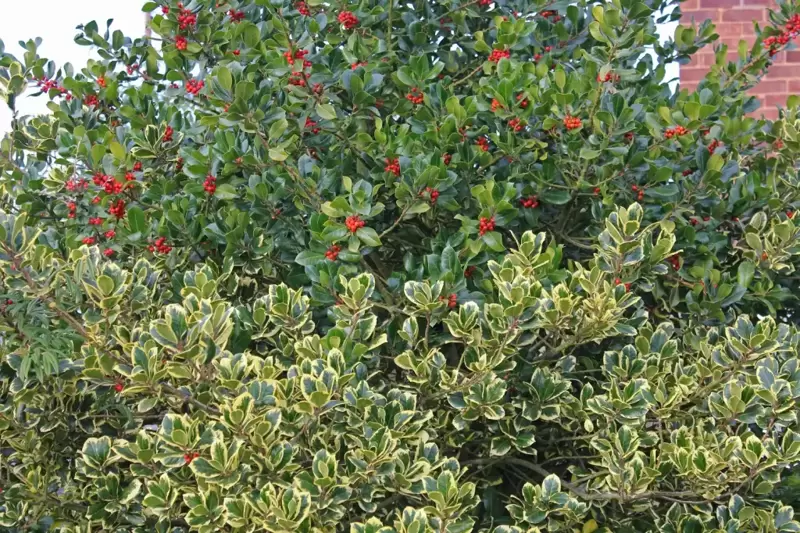
It will soon be Christmas, and what better way to celebrate the season and bring festive cheer to your garden than with two traditional Christmas favourites – Holly and Ivy. Countless cards carry their image, often with leaves touched by frost or covered with a crisp layer of snow, and your garden displays will have even greater appeal.
These are perfect garden plants, and they’ll provide material for indoor arrangements and table decorations too. What better way to welcome visitors over the Christmas period than with a woven wreath made using holly, ivy and other seasonal flowers and foliage picked from the garden.
Both plant families offer a wide range of wonderful evergreen varieties, with many boasting beautifully variegated leaves. Fruits and berries provide seasonal food for hungry birds, but if you want a few sprigs to enjoy indoors you’ll need to protect berry-laden branches with pieces of tightly fastened fine netting or fleece to keep birds away.
Holly is hardy and evergreen, making it an ideal shrub to form part of the backbone or structure every garden needs. The common or English Holly (Ilex aquifolium) grows across the country, but as well as choosing holly with glossy green leaves there are lots of different cultivars with more colourful foliage.
Most holly plants are either male or female, so to ensure you get a crop of berries you’ll need to grow a female variety and ensure there’s a male nearby to pollinate its flowers. However, don’t always take the name as a guarantee of the plants sex, as the popular ‘Silver Queen’ is actually male, and ‘Golden King’ is a female berry-bearing variety! If you want berries and only have room for one plant then look out for self fertile ‘J.C. van Tol’ which also has almost thornless elliptical green leaves.
With thick evergreen growth and spiny foliage, holly is also a good choice of shrub to form a dense and secure boundary hedge to your property. Most varieties carry spiny leaves, but for something with extra deterrent consider the variegated Hedgehog Holly (Ilex ‘Ferox Argentea’). Holly can also be tightly clipped into formal shapes and topiary too.
Leaf sizes and shapes vary enormously between varieties, so explore the Ilex family to discover more. For instance, the Box-leaved or Japanese Holly is often used to create small topiary features. Or for something a little different search out varieties of Blue Holly (Ilex x meserveae) that produce deep green leaves with a bluish tinge.
Ivy is a valuable climber or ground cover plant, perfect for a shady spot or for cladding bare fences or garden structures. However, it must be kept within bounds with regular pruning to prevent it spreading too far or becoming invasive.
Hundreds of varieties have been bred over the years, and many garden favourites have colourful leaf forms or attractive variegated patterns adding to their appeal. Established ivy carries flowers late in the season that provide valuable nectar for late-flying butterflies and bees, as well as great nesting site opportunities for blackbirds and others. Small-leaved ivy trails gracefully down the sides of baskets and containers, the perfect partner for many flowering and foliage plants.
So, for a traditional touch to your seasonal displays, check out the varieties of Holly and Ivy available at your local garden centres and nurseries now.
TOP FOUR FAVOURITE HOLLY VARIETIES
From green to gold, silver and cream, choose holly varieties that add interest to your garden right through the year, including these award-winning varieties.
‘Golden King’ – Berrying female variety
‘Silver Queen’ – Male variety
‘J.C. van Tol’ – Self-fertile berrying female variety
Hedgehog Holly (Ilex ‘Ferox Argentea’) – Male variety
TOP FOUR FAVOURITE IVY VARIETIES
Dozens of ivy varieties are available, and many of the best have received an Award of Garden Merit (AGM) from the Royal Horticultural Society. Here are a few of the most popular ivy varieties to consider for your garden and patio pots.
‘Sulphur Heart’ (also sometimes called ‘Paddy’s Pride’)
Hedera colchica ‘Dentata Variegata’
‘Glacier’ – versatile variegated variety, often used in indoor arrangements
‘Ivalace’ – attractive crimpled and lobed green leaves
OTHER HOLLY VARIETIES
Also highly recommended:
Ilex x altaclerensis ‘Lawsoniana’ – Berrying female variety
Ilex aquifolium ‘Argentea Marginata’ – variegated female variety
Ilex aquifolium ‘Madame Briot’ – variegated female variety
Ilex aquifolium ‘Handsworth New Silver’ – prolific berrying female. Variegated foliage.
Blue Holly Ilex x meserveae including Blue Angel, Blue Prince and Blue Princess
OTHER IVY VARIETIES
Also highly recommended:
‘Gloire de Marengo’
‘Goldheart’ (also called ‘Oro di Bogliasco’)
Hedera helix ‘Parsley Crested’
TOP TIPS FOR PLANNING AND PLANTING
- Prune holly carefully with secateurs to shorten individual shoots rather than a hedge cutter or shears that can tear and damage leaves.
- Established, overgrown holly can be cut back hard in spring to encourage new growth to develop from nearer the base to revitalise old plants.
- Ivy can be invasive, so check growth regularly through the year, snipping off wayward shoots to keep plants in check.
- Plain green shoots sometimes develop on variegated plants. Prune these away at their base as soon as you spot them.
OTHER POPULAR PLANTS OF THE MOMENT
Both Holly and Ivy fit in well with most garden plants, contributing to planting combinations that look good all-year-round. Ivy trained on fences can be grown in combination with other climbers, like the Crimson Glory Vine, Vitis coignetiae.
Partner-up holly with other shrubs and evergreens, or plant summer flowering clematis at their base so they can scramble up them for support and layer on a display of brilliant blooms.
